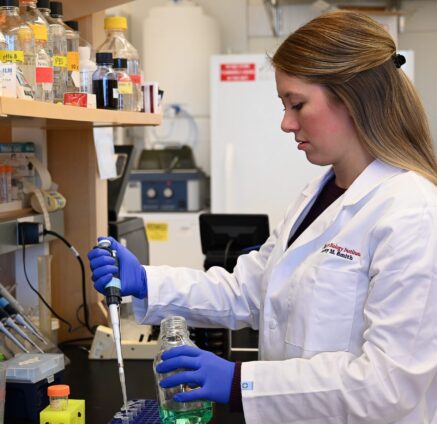Celebrating the Frontiers of Science on National DNA Day
April 25, 2022Today we celebrate National DNA Day, commemorating the groundbreaking discovery of the double helix structure of DNA.

Today we celebrate National DNA Day, commemorating the groundbreaking 1953 publications in the journal Nature by James Watson, Francis Crick, Maurice Wilkins, Rosalind Franklin, and colleagues describing the discovery of the double helix structure of DNA. DNA Day also commemorates the declared completion of the Human Genome Project, 50 years later, in 2003.
Awareness of DNA has become nearly ubiquitous over the last few years, and the application of this molecule touches every part of our lives. Whether it’s finding unknown relatives through Ancestry.com or 23andMe, sequencing the evolution of the SARS-CoV-2 pathogen, screening babies to identify rare diseases, or performing liquid biopsies to help identify targeted treatments for cancer patients, DNA science has entered the public consciousness in ways that would have been unimaginable to Franklin, Watson, Crick, Wilkins, and other trailblazing scientists of that era.
It’s easy to forget that less than 70 years ago genomics was an entirely new frontier. The advancements in this area demonstrate what’s possible with scientific ingenuity.
Less than a decade after the discovery of DNA, the PhRMA Foundation was formed. Since its founding in 1965, the organization has supported numerous scientists who have transformed our understanding of human genetics and applied that knowledge to advance the new field of personalized medicine. These pioneers include:
- Inventor J. Craig Venter, whose company, Celera Genomics, raced the international research consortium working on the Human Genome Project
- Raymond Woosley, founder of the Critical Path Institute, which convenes industry, academia, and government to work together to accelerate the medical product development process
- Susan Band Horwitz, who discovered the mechanisms behind the anti-cancer drug Taxol
- George Church, who started a center of excellence for genomics at Harvard University and is training the next generation of scientists in the field
Through the Foundation’s translational research grants, we continue to fund researchers on the frontiers of personalized medicine. More broadly, our grants support cutting-edge exploration by early career scientists and researchers at the forefront of innovation and discovery. These efforts help to build a talent pipeline for the pharmaceutical industry, government, and academia that is well-versed in the science and impact of medicines on patient lives.
As I reflect on the impact of Franklin, Watson, Crick, and Wilkins, I can’t help but wonder which discoveries of today will be as consequential to human life tomorrow as DNA science. The possibilities are truly endless, and the Foundation looks forward to helping advance these important frontiers through our grant programs in the coming years.
